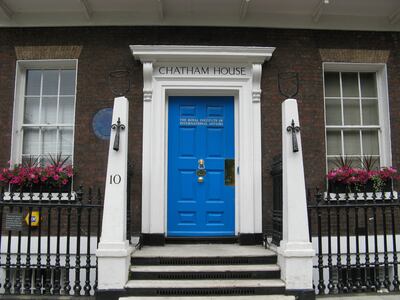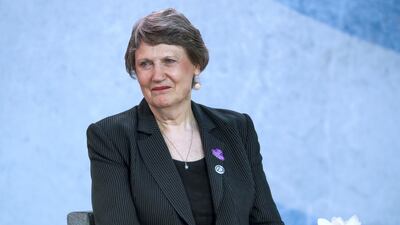A new global health commission established by London think tank Chatham House seeks to strengthen worldwide medical systems to ensure a higher level of universality in the treatment of the sick.
Jointly chaired by Helen Clark, the former prime minister of New Zealand, and Jakaya Kikwete, former president of Tanzania, the panel has been asked to seize the opportunity to address massive global inequalities highlighted by the Covid-19 pandemic.
The Chatham House Commission for Universal Health wants countries to boost health systems, making them more resilient for the next pandemic and better at protecting the poor and vulnerable in society. "Health is nutrition, education, service access, whether you live in a clean environment or whether you live in peace," declared Ms Clark on Friday. "I think we will have a broader focus than just services."
There are 30 members on the commission, including Jordanian campaigner Princess Dina Mired and Dr Shereen El Feki, director of the Mena regional support team at UNAIDS.
Past pandemics and eras of conflict have proved a catalyst for the transformation of health care, something that the commission hopes will create the context for their work.
“Covid-19 has starkly exposed the gaps in vital health services and the population groups disproportionately affected by the pandemic and left behind in virtually every country in the world,” said Ms Clark.
“History shows that so many of the great universal health systems have emerged from previous devastating crises like those born from the rubble of [the Second World War] and now, in fact, is the perfect time to grasp such opportunities again. We hope this commission will help show the way.”
Lagging efforts promoted by the UN to make universal health care the centrepiece of the Sustainable Development Goals programme offering a starting point for the commission.
The World Health Organisation has set a “triple billion” goal for 2023, which aims to see one billion more people benefitting from universal health care coverage, one billion more better protected from health emergencies and a billion more enjoying better health and well-being.
Reports by the commissioners will seek to identify the common factors enabling reforms. The global food crisis and pandemic have created a need to develop clear policy options for national health systems to “build back better”.
Through its work the commission seeks to inspire political leaders in all countries to increase their political and financial commitments to health, both domestically and multilaterally.
Raising standards in poor and middle-income countries is a particular priority.

"There's been an alarming lack of solidarity between rich countries and the developing nations especially in terms of guaranteed universal access to health insurance, life-saving vaccines, tests and medicines," said Mr Kikwete, the co-chairman at the launch on Friday. “The world has consistently underinvested in health systems. This has had dire consequences in terms of the loss of millions of lives and trillions of dollars of economic output.”
“The case for universal health reforms has never been stronger. But moving towards a publicly financed health system, which will better protect the poor and vulnerable, is an inherently political process, which requires genuine political commitment across the highest levels of government.
“Working together, our commission will identify options to achieve universal health and generate the political will to achieve them.”


